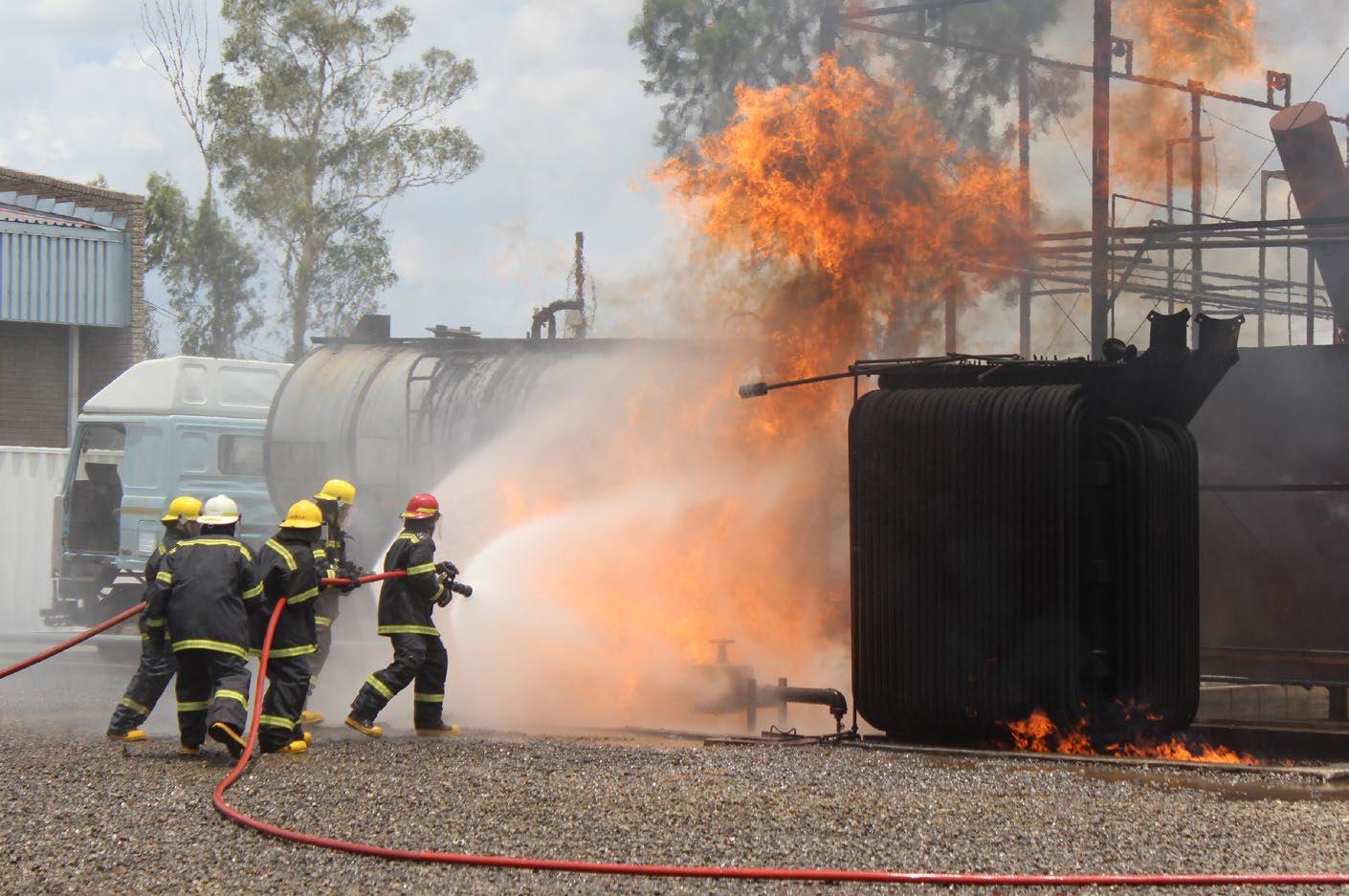
6 minute read
Training IFSAC accreditation for ETS Emergency Training Solutions
ETS will continuously engage with stakeholders to ensure that programmes are aligned with the needs of employers and fire fighters
Advertisement
ETS Emergency Training Solutions based in Redan in Vereeniging, South Africa, is an accredited International Fire Services Accreditation Congress (IFSAC) certification entity. The company had its IFSAC accreditation visit in August 2018 to obtain accreditation as an IFSAC certification entity for approved National Fire Protection Association (US) (NFPA) levels. ETS was accredited on 3 November 2018 and received its accreditation certificate at the IFSAC Fall meeting held in Saint Louis, USA.
The scope of the IFSAC accreditation visit consisted of the following 1. A review of ETS company policies and procedures to ensure compliance with
South African legislation and regulations 2. Review of ETS policies and procedures to ensure that they meet all requirements of IFSAC policies, procedures and bylaws 3. A detailed review of assessment criteria for all the NFPA levels applied for 4. An audit of ETS ability to consistently test and assess
NFPA levels according to IFSAC standards and criteria 5. An audit of ETS quality management systems to ensure compliance with South African and
IFSAC standards and requirements 6. A review of ETS ‘best practises’ in compliance with internationally accepted standards 7. A review of resources available to maintain assessment standards
As part of the application process, ETS had to submit proof of empowerment within South African legislation that enabled ETS to assess standards prior to the IFSAC accreditation visit. After a very vigorous and thorough evaluation process, ETS was recommended for membership by the IFSAC Certificate Assembly Board of Governors (CABOG) and approved by the Board of Governors (BOG) in 2015.
What does IFSAC accreditation mean for ETS Emergency Training Solutions? ETS can issue certificates with the IFSAC seals for the NFPA levels we are approved and accredited for. Candidates can be assured that the Assessments and certification meet IFSAC criteria and standards and certificates will be recognised at any entity, company, employer or country the IFSAC seal is accepted.
The IFSAC accreditation does not imply that ETS can accredit training providers in South Africa. The responsibility for accreditation as a training or skill development provider lies with the Quality Council for Trades and Occupations (QCTO) or Skills Education Training Authorities (SETAs). It is the responsibility and obligation of training providers to be accredited by the QCTO or relevant SETA. The IFSAC accreditation and certification process serves as a third party validation for internationally recognised quality assurance purposes, confirming that ETS meet recognised standards.
Within the IFSAC context, ETS is responsible to assess the requirements as listed within the relevant NFPA standard. IFSAC requirements do not stipulate on where, when and for how long training must happen but focus on the validity, currency and reliability of the assessment process and quality of control measures to ensure consistent assessments. ETS must only obtain confirmation that a candidate had opportunity to prepare for assessment and that they have a clear understanding of the assessment criteria listed in the relevant standard they are applying to be assessed for. This proof can be in the form of training programmes completed related to the standard, workplace experience or a formal aligned training programme that is presented in line with the relevant standard.
ETS can assess candidates at any venue that meet set requirements and the venue is suitable for the relevant standard that is being assessed.
ETS is committed to aligning NFPA standards with relevant QCTO developed qualifications

What does ETS accreditation mean for the South African fire and emergency services? Fire and emergency response personnel and practitioners have an alternative and simplified option to access internationally recognised NFPA certification through the IFSAC quality assurance process. ETS has various means for fire fighters to qualify for access to the assessment process in order to be certified.
The rules, as agreed and approved by IFSAC, for certification are: 1. ETS cannot certify what they did not assess. In order for a candidate to be certified by
ETS, they must quality assure and issue the assessment tools (knowledge and skills) for all levels that they want to certify. 2. ETS does not accredit training and skill development providers.
It is the responsibility of training and skill development providers to accredit with QCTO or the relevant SETA to provide training for fire and emergency response related standards and qualifications. 3. QCTO and SETA accredited training or skill development providers can conduct the training and ensure candidate preparedness with formative assessments within the scope and abilities of the provider. 4. Training providers prepare the candidates for certification assessment and ETS will plan and conduct the assessment according to an agreed plan.
Assessment can be conducted at any venue that meets predetermined requirements and have sufficient resources available. 5. ETS is committed to assist any employer or training provider, not registered with the QCTO, with the accreditation process.
Assessment requirements In order to assist and accommodate individuals with workplace experience and various previous training, both formally and informally, ETS offers various options for candidates to the assessment process in order to obtain ETS certification with the IFSAC seal. No certificate can be issued unless the candidate was assessed by ETS. ETS cannot certify what they did not assess; they can only certify what they assessed.
ETS offers the following options for individuals, employers and skill development and training providers:
Attend a formal ETS course that is aligned with the relevant standard ETS has aligned some of the NFPA standards with the relevant SAQA-registered qualifications. This has the benefit that a candidate can be assessed once and obtains the credits for both SAQA and IFSAC certification. Attend a course with a registered skill development and training provider This offer is available to QCTO or SETAregistered training providers. Skills development and training providers can enter into an agreement with ETS to conduct the IFSAC certification assessment criteria. These agreements will be based on site-specific requirements. These agreements will not require any membership, accreditation or related fees. Accreditation of skills development and training providers are the responsibility of the QCTO or SETA. The skills development and training providers are responsible to train and prepare candidates for assessment. Once the training programme is completed and candidates are prepared for assessment, ETS will conduct the assessment as agreed with the skills development and training provider.
Workplace experience Candidates can submit a portfolio of evidence with the relevant and required criteria. Once the criteria are met, a candidate can enter the assessment process without entering a formal or informal training programme. The emphasis here is that this option allows for individuals to be assessed by attending training. To be certified, the candidate must be assessed. This option is available for candidates that submit relevant proof of experience and with endorsement through the relevant employer(s).
Self study Some of the NFPA programmes allow candidates to enter the assessment process through self study. These programmes will be advertised with the option for self study.
Recognition of previous learning Candidates can enter this option on submitting proof of recognised and approved previous learning.
ETS is committed to aligning NFPA standards with relevant QCTO developed qualifications to ensure learners can obtain credits for international IFSAC certification as well as national qualifications with a single assessment. They will continuously engage with stakeholders to ensure that programmes are aligned with the needs of employers and fire fighters.











